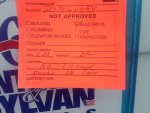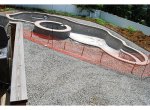Hey All
Just looking ot vent a little since i just found out i failed the bonding gris inspection for the 2nd time. :grrrr:
There seems to be a fight between the inspector and my PB. My PB installed a bonding grid in accordance to 2010 NJ state law. Its basically a single copper line connected at 4 points around the pool to the rebar of the pool. The town rejected that set up, and specifically asked the PB to follow 2008 code. Is it me or does that not sound right???? Can I assuming that 2008 code was more conservative and therefore the inspector is looking out for my best interests?
Just looking ot vent a little since i just found out i failed the bonding gris inspection for the 2nd time. :grrrr:
There seems to be a fight between the inspector and my PB. My PB installed a bonding grid in accordance to 2010 NJ state law. Its basically a single copper line connected at 4 points around the pool to the rebar of the pool. The town rejected that set up, and specifically asked the PB to follow 2008 code. Is it me or does that not sound right???? Can I assuming that 2008 code was more conservative and therefore the inspector is looking out for my best interests?



 . Sounds like you have an inspector who will ensure the PB get's it right. Rejections can be a pain in the side, but they are acting in you best interest and ensuring you have a safe pool.
. Sounds like you have an inspector who will ensure the PB get's it right. Rejections can be a pain in the side, but they are acting in you best interest and ensuring you have a safe pool.